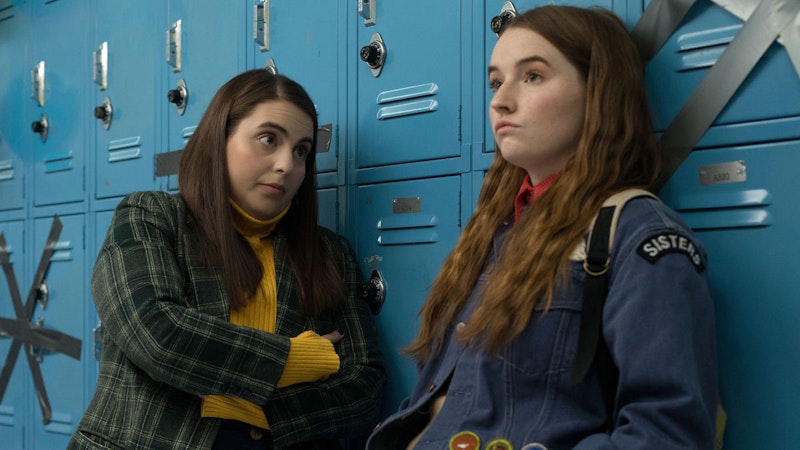While flipping channels last week, I came upon Fast Times at Ridgemont High, my favorite teen comedy. I watched it for maybe the sixth time, enjoying it as much as I did the first time. The writing's crisp and witty, the performances top-notch, and the movie doesn't drag even for a minute. Having just experienced genre movie-making at its finest, I was happy to see that the latest high school comedy, Booksmart, was playing at my local theater. I bought a ticket and sat back, ready for some good laughs. Alas, not even one laugh, or even a chuckle, was forthcoming. The critics had, once again, hoodwinked me.
Both Fast Times and Booksmart conclude with a high school graduation, but the former moves at a fast clip, while the latter plods along. I kept telling myself to hang in there until the setup was in place and the comedy could blossom, but halfway through I realized my hopes were in vain. I was doomed, an unsuspecting victim of the post-comedy era, where laughs are not an essential element.
Booksmart's plot centers around two high-achieving high school senior girls who are inseparable best friends sharing a lack of sexual experience. One of them's a lesbian and the other's a chubby, fast-talking extrovert, and they come to the realization, just before graduation day, that they've studied and participated in student government so much that they've missed out on a lot of teenage fun.
This epiphany arrives in the least believable way—Molly (Beanie Feldstein), discovers that a group of her fellow students, who she assumed were on the fast track to nowhere, are going to attend elite universities too. She's class valedictorian, but somehow didn't figure this out until the 11th hour. Molly then decides that she and her best friend/sidekick, Amy (Kaitlyn Dever), are going to have one blowout night of partying that's supposed to make up for their years of seriousness. A similar concept delivered laughs for Superbad, which didn't presume to make even the slightest social statement, but it falls flat under the weight of the ponderous Booksmart.
But first-time director Olivia Wilde has woven together parts from past coming-of-age comedies to produce something those films lacked—a true appreciation of diversity. This is what has entranced the critics, who I imagine were also impressed that the two protagonists are political progressives, which the director establishes early on even though it doesn't add much of anything to the narrative. In reading the rave reviews, you get the impression that they saw a totally different movie, but it's more like they thought any assessment of the film that would hold it to normal standards of comedy would mark them as fat-shaming, gay-bashing MAGA-hat-wearing deplorables. They graded this one on a curve.
A major clue to what Booksmart's about appears on Metacritic. There's a marked discrepancy between reactions by film critics (Metascore) and regular viewers (User Score). The film got an 84 (out of 100) Metascore, with 48 positive, three mixed, and zero negative reviews, while the User Score was "generally unfavorable reviews"—150 positive, 21 mixed, and 216 negative. Many unsuspecting users paid for some old-fashioned chuckles but ended up enduring a modern "message movie" instead. One thing’s for certain—the critics aren't writing for them.
Fast Times at Ridgemont High's cast was like a baseball team with a stacked lineup. Sean Penn nailed his stoner/surfer role, Judge Reinhold's Brad Hamilton was hilarious in his fast-food uniform, Jennifer Jason Leigh and Phoebe Cates turned in strong performances, and Brian Backer's nerdy character, Mark Ratner, amuses throughout the movie.
Booksmart's Molly and Amy (who's soon headed to Botswana to "help people make tampons") don't have enough comedic punch to carry the film alone, but the supporting characters aren't up to the task, with the exception of Skyler Gisondo's poor little rich boy, Jared, who dominates the screen when he's on it. Put him on equal footing with Molly and Amy in a trio of tight friends and you'd get a much better movie. Will Forte and Lisa Kudrow are wasted as Amy's earnest, goofy parents. Molly's parents don't even make an appearance, making her character even more of a cipher.
Booksmart needs a darker character like Fast Times' Mike Damone (Robert Romanus) to temper its sweetness. Olivia Wilde's made a teen movie that's aimed at Obama and Hillary Clinton voters, not teens, because Happy Rainbow High—or whatever the school's called—doesn't remotely resemble any high school in this country. The only visible conflict is two smug academic stars looking down on their classmates, but they begin to fix their attitudes on the night before graduation.
Wilde throws in a showy drug trip scene involving animated Barbie-esq dolls and a visually-impressive set piece filmed underwater in a pool, but they're peripheral to the film—perhaps borrowed from other filmmakers. Bookmark's derivative. I'm guessing its most stripped-down pitch went something like, "This is Superbad but with chicks, including a gay one."

